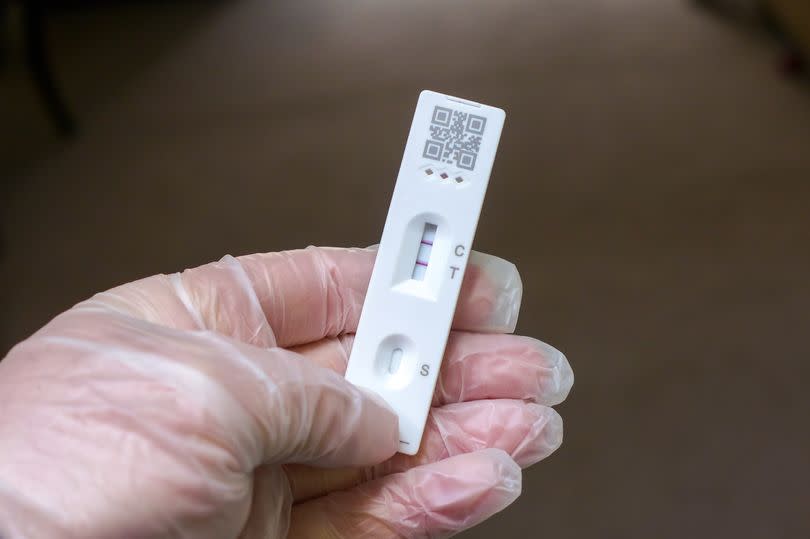Man urges Brits to check expiry date on Covid-19 tests as cases dramatically rise

Amid the resurgence of Covid-19 cases in the UK, it's important to know what to do with out-of-date Covid-19 tests.
With new Covid-19 variants, such as the 'FLiRT' - Fresh Lineage of Rapid Transmission - on the rise, experts are monitoring the situation closely. Hospitalisation rates have seen an uptick, with a 23% increase from the previous week, reaching 3.31 hospitalisations per 100,000 people around June 16.
If you're feeling under the weather with symptoms like coughing or fever, you might consider using an old Covid-19 test kit. However, these kits do expire and using them beyond their expiry date is not advised.
A young content creator and aircraft mechanic, known online as 'Flying Chaos', learned about the importance of checking test expiry dates after posting his ordeal on TikTok. He warned his followers: "If you have at home Covid test kits sitting around, check their expiration date because it could be expired," through his @flying_chaos account.
He further cautioned: "And if they're expired, they could give you a false positive or a false negative. We're not able to go back to work because of a possible false positive - two possible false positives. Check your Covid tests, make sure they're not expired please!"
The NHS states that typical Covid-19 rapid antigen tests, which require a nose swab, usually last for about two years. Nevertheless, it's essential to verify the specific expiry date on each individual test kit, as some may vary.
Professor Tim Spector, leading scientist at Zoe, previously stated to the Huffington Post: "Lateral flow tests or LFTs do come with an expiry date on the box. However, the date on those can vary widely and we are still unsure how inaccurate they become.
"An expired test will produce invalid results. If you have a few boxes at home, it would be wise to take a quick look for the date and use them in order of which box runs out first."
While these rapid tests aren't infallible for detecting Covid-19, a 2021 review of 64 studies claimed they correctly identify 72% (on average) of symptomatic people, and 58% of people who are asymptomatic.
However, their effectiveness may diminish over time as the testing liquid evaporates, possibly affecting the reliability of any swab tests taken, according to Cleveland Clinic.
At present, the Government is keeping a close eye on the new FLiRT variants both in the UK and globally. Although there's no current alteration to 'general public health advice', further data is necessary before forming any conclusions about the variant's seriousness.
Here are the symptoms people should look out for if they're worried they may have caught Covid-19:
High temperature or shivering (chills) – a high temperature means you feel hot to touch on your chest or back (you do not need to measure your temperature)
New, continuous cough – this means coughing a lot for more than an hour, or 3 or more coughing episodes in 24 hours
Loss or change to your sense of smell or taste
Shortness of breath
Feeling tired or exhausted
Aching body
Headaches
Sore throat
Blocked or runny nose
Loss of appetite
Diarrhoea
Feeling sick or being sick
For more information, visit the NHS website.

 Yahoo News
Yahoo News 
